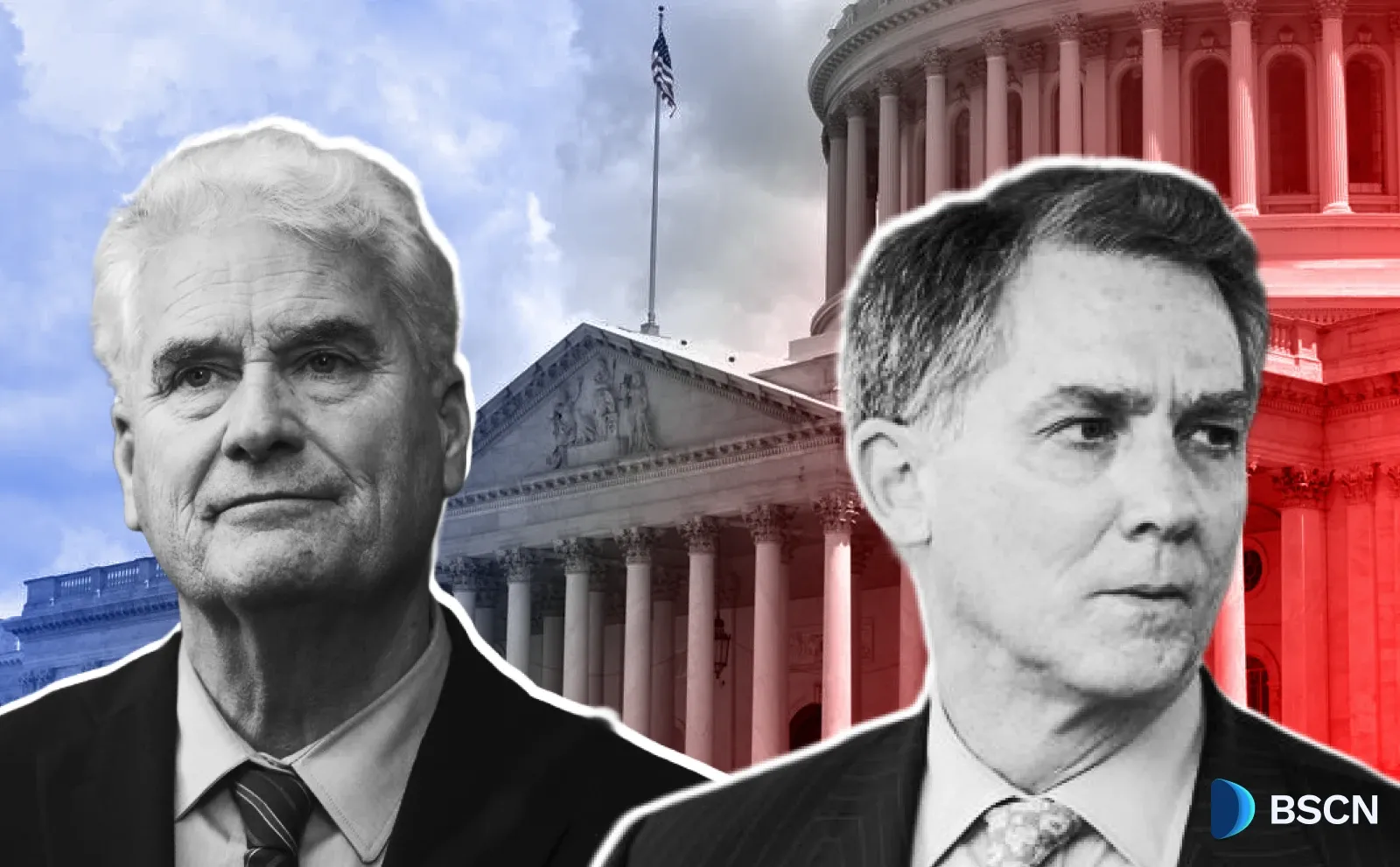Bitcoin Recent Updates: What’s Driving the Market Slowdown?

Bitcoin drops to $93K as ETF outflows, whale selling, and geopolitical tensions weigh on the market. Here’s a detailed breakdown of what’s happening.
Soumen Datta
November 17, 2025
Table of Contents
Bitcoin recently fell to $93,000, its lowest level in six months. The main reasons are outflows from spot Bitcoin ETFs, long-term holders selling, and rising geopolitical tension.
These factors have slowed demand and pushed the market into a more cautious phase. Crypto firms, analysts, and global institutions are weighing in on what this means for Bitcoin as the year progresses.
Bitcoin Falls to Six-Month Low
Bitcoin briefly dipped to $93,029, a level last seen in May. The downturn came during Asian morning hours on Monday and continued through the weekend. The broader crypto market reflected the pressure as total market capitalization slid from $3.7 trillion to $3.2 trillion over seven days, according to CoinMarketCap.
While short-term volatility is not new to Bitcoin, several executives and analysts say this drop is tied to specific, measurable pressures instead of random market behavior.
Why Bitcoin Is Losing Momentum
Bitcoin’s price is being hit on several fronts at once. Traders are facing a weaker macro environment, ETF demand is slowing, and long-term holders are selling into a softer market.
Major Factors Behind the Decline
- Long-term whales are selling after months of gains
- Spot Bitcoin ETFs have shifted from strong inflows to consistent outflows
- Global markets have moved into risk-off mode as rate-cut expectations fade
- Escalating geopolitical tensions have pushed investors out of risk assets
Long-Term Holders Finally Selling
Noelle Acheson and other analysts have pointed to steady distribution from older wallets. James McMillin highlighted this trend through on-chain data, noting that long-term holders are finally cashing in after an extraordinary run.”
He added that fundamentals suggest liquidity tailwinds for deeper downside, meaning fewer buyers are stepping in to absorb the coins being sold.
With older wallets sending out their holdings after months or even years of inactivity, the market is now absorbing “old coins being distributed into a softer bid,” according to McMillin.
ETF Outflows Intensify the Pressure
Spot Bitcoin ETFs helped fuel the rally earlier this year. Now, those same products are showing signs of weakness.
Despite the U.S. Senate approving the funding bill last week, spot Bitcoin ETF flows saw $1.11 billion in outflows from Nov. 10 - Nov. 14, based on SoSoValue data.
Why ETF Demand Matters
Spot ETFs act as straightforward channels for institutions to gain Bitcoin exposure. When inflows slow:
- New demand weakens
- Market liquidity thins
- Existing sellers hit a smaller pool of buyers
This combination makes the market more sensitive to sell pressure from large holders.
Some executives say ETF outflows are being influenced by a wider slowdown in global tech markets, as future-oriented valuations cool and investors adjust to macro uncertainty.
Macro and Geopolitical Pressure Adds to the Downturn
According to CoinTelegraph, Holger Arians, CEO of Banxa, said markets are “running very hot relative to the state of the world.” He pointed to unresolved geopolitical tensions and rising global uncertainty as risk factors that are pushing investors away from volatile assets.
Matt Poblocki of Binance ANZ agreed, noting that crypto remains a “maturing asset class” and is often impacted by big shifts in economic and political conditions.
This shift toward caution has widened as global markets rethink their expectations for rate cuts. When rate-cut hopes fall, both tech and crypto tend to cool as borrowing remains expensive and investors move toward safer assets.
Institutional Moves: Harvard’s Bitcoin Bet Grows
Harvard Management Company increased its exposure to the iShares Bitcoin Trust (IBIT) to 6.8 million shares, worth $442.8 million as of September 30, according to a regulatory filing. That’s a sharp rise from 1.9 million shares in August.
ETF analyst Eric Balchunas called this move “super rare” for an endowment fund, which is typically hesitant to use ETF vehicles at all.
Key points on Harvard’s move:
- IBIT is now Harvard’s largest disclosed investment
- It accounts for about 1% of the total endowment
- Harvard is currently the 16th-largest holder of IBIT
- The school also increased positions in Amazon, Microsoft, and Alphabet
Taiwan Considers a National Bitcoin Reserve
Premier of the Republic of China (Taiwan), Zhuo Rongtai, said the government is preparing a full report on confiscated Bitcoin holdings and will evaluate whether the country should establish a strategic national Bitcoin reserve.
The report will:
- Detail total Bitcoin seized
- Review options for holding or liquidating the assets
- Consider benefits and drawbacks of a national BTC reserve
- Guide possible Bitcoin-friendly regulations over the next six months
This is the first time Taiwan has publicly acknowledged Bitcoin as a potential reserve asset. Local lawmakers have called the move a “breakthrough.”
Trump Media Reports Heavy Losses Despite Bitcoin Holdings
Trump Media and Technology Group, operator of Truth Social, posted a $54.8 million loss in Q3 despite holding 11,542 BTC as part of its treasury strategy.
Their financial results show:
- Revenues: $972,900, down from $1 million last year
- BTC holdings contributed $15.3 million in realized income
- The company saw $33 million in unrealized gains from Cronos (746 million CRO)
CEO Devin Nunes said the firm has secured its “financial future with a massive Bitcoin treasury,” though the quarter still reflected rising operational costs and limited revenue.
Quantum Computing Raises Security Questions
Although still emerging, quantum computing is becoming a more serious concern for blockchain security.
Borderless Capital partner Amit Mehra said recent hardware advancements mean quantum threats are “definitely a problem” in the near future, even if not immediate. Quantum machines could break today’s cryptographic algorithms, making post-quantum security a priority.
Charles Edwards of Capriole Fund issued a stronger warning. On October 15, he said on X:
“If Bitcoin doesn’t solve Quantum in the next year, gold will keep outperforming it forever.”
He claims the industry must choose a solution within one year.
Conclusion
Bitcoin’s recent decline reflects a mix of measurable market forces rather than a single dramatic trigger. ETF demand has weakened, long-term holders are selling into a softer market, and global conditions have shifted toward caution. Institutions like Harvard continue to build positions, while national discussions in Taiwan show how governments are reassessing Bitcoin’s role. At the same time, concerns such as quantum security highlight the technical challenges that developers must address. Together, these updates show Bitcoin’s current capabilities, its present market structure, and the factors shaping its performance today.
Resources:
Bitcoin price action: https://coinmarketcap.com/currencies/bitcoin/
Bitcoin spot ETF data by SoSoValue: https://sosovalue.com/assets/etf/us-btc-spot
Harvard Management Company’s regulatory filing: https://www.sec.gov/Archives/edgar/data/1082621/000119312525283114/xslForm13F_X02/47098.xml
Trump Media and Technology Group’s regulatory filing: https://s3.amazonaws.com/sec.irpass.cc/2660/0001140361-25-040977.htm
Read Next...
Frequently Asked Questions
Why did Bitcoin fall to $93,000?
Bitcoin fell due to ETF outflows, whale selling, and rising geopolitical tension. Combined, these factors created lower demand and increased sell pressure.
Are institutions still interested in Bitcoin?
Yes. Harvard Management Company increased its IBIT position to $442 million, showing continued long-term institutional interest even as short-term ETF flows slowed.
Is quantum computing a real threat to Bitcoin?
Experts say emerging quantum technology could break current cryptography in the future, prompting the industry to explore post-quantum security upgrades.
Disclaimer
Disclaimer: The views expressed in this article do not necessarily represent the views of BSCN. The information provided in this article is for educational and entertainment purposes only and should not be construed as investment advice, or advice of any kind. BSCN assumes no responsibility for any investment decisions made based on the information provided in this article. If you believe that the article should be amended, please reach out to the BSCN team by emailing [email protected].
Author
 Soumen Datta
Soumen DattaSoumen has been a crypto researcher since 2020 and holds a master’s in Physics. His writing and research has been published by publications such as CryptoSlate and DailyCoin, as well as BSCN. His areas of focus include Bitcoin, DeFi, and high-potential altcoins like Ethereum, Solana, XRP, and Chainlink. He combines analytical depth with journalistic clarity to deliver insights for both newcomers and seasoned crypto readers.
Crypto Project & Token Reviews
Project & Token Reviews
Comprehensive reviews of crypto's most interesting projects and assets
Learn about the hottest projects & tokens

















